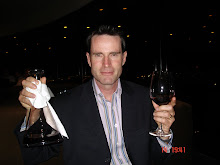Monday, July 30, 2007
What are we doing here?
So here we are studying the Internet and what do I find? An article entitled The Internet on the Media Studies Infobase suggests that "asking a student to comment in a couple of thousand words on the likely impact of 'the Internet' is just plain daft". As he goes on to suggest, it's a good exercise for the mind - and that can't be all bad;-)
Stories, Not Information: Transforming Information Literacy
This is a hard read, if for no other reason than the point that's being made is obscure and dry. Purdue is obviously clever at what he does but he falls into the trap of being the point he's attempting to make; and the point he makes is that Information Literacy, as it's described in the literature, misses the point. He suggests that is through the process of telling stories - not through some stodgy, mechanistic fomula - that we gain access to what literacy is all about. And what's it all about? It's about invocation of pictures and images that stir human emotions and bring us to life as active, engaged citizens in a democracy.
Information Ecologies: Using Technology With Heart
The authors are respectively trained in computer science and anthropology and are residents of Silicon Valley - the home of technology. They begin their work with reference to the 1926 movie Metropolis, a tale of the devastating consequences of blindly creating technologies for technology's sake.
The authors here, take the view that it's much more important, when relating especially to new technology, to ask the 'know-why' question than it is to ask the 'know-how' question. They warn against the dangers of simply accepting technology as something outside of human creation - of viewing technology as being "inevitable". Citing the example of two Microsoft executives who predict that all the information about all objects, including humans, will one day be online, they urge readers to become aware of the stories and rhetoric that creates and justifies the use of technology.
Suggesting that both the utopian and dystopian views of technology are accurate to some degree, they concede that these diametrically opposed positions have their drawbacks. They contend that technology be viewed in its context, part of a much bigger ecology that helps us better understand that which we use daily.
The authors here, take the view that it's much more important, when relating especially to new technology, to ask the 'know-why' question than it is to ask the 'know-how' question. They warn against the dangers of simply accepting technology as something outside of human creation - of viewing technology as being "inevitable". Citing the example of two Microsoft executives who predict that all the information about all objects, including humans, will one day be online, they urge readers to become aware of the stories and rhetoric that creates and justifies the use of technology.
Suggesting that both the utopian and dystopian views of technology are accurate to some degree, they concede that these diametrically opposed positions have their drawbacks. They contend that technology be viewed in its context, part of a much bigger ecology that helps us better understand that which we use daily.
Nardi, B., & O'Day, V. (1999). Information Ecologies: Using Technology With Heart. Retrieved July 30. 2007, from http://webct.curtin.edu.au/SCRIPT/301516_300579_a/scripts/student/serve_page.pl/301516_300579_a/welcome.html?1122825876+1590035375+OFF+intro.html+Anchor-Lorem-49575
Welcome
Here's the first post of a blog that I expect to have completed within 14 weeks. This blog will guide you through the process of becoming an advanced Internet user, and is designed especially to help students by providing the electronic resources needed to answer the many questions that are faced when contemplating a life online. I'll also provide a learning journal of my experiences in the process of my own learning.
Please feel free to comment. It helps us all learn if we can ask lots of questions and have a conversation that builds on one another's knowledge.
Please feel free to comment. It helps us all learn if we can ask lots of questions and have a conversation that builds on one another's knowledge.
Subscribe to:
Posts (Atom)
